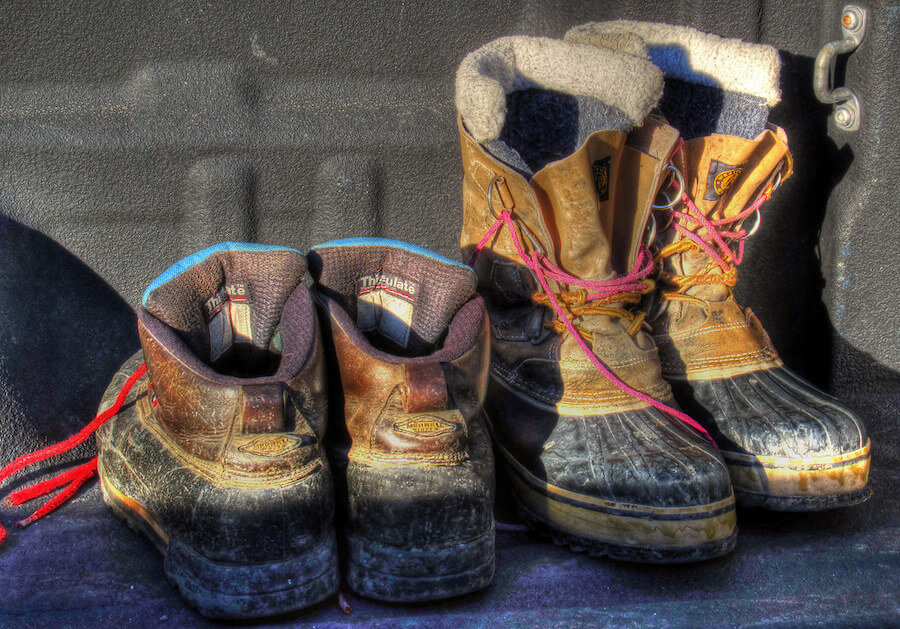Sturdy work boots are usually the first thing that pops your mind when you think of an industrial environment.
They are essential personal protective gear for impact protection and protection in dangerous areas.
However, nothing will last forever. So, how long do work boots last? It depends on the type you use and other factors.
If you want to know precisely the longevity of this footwear, it’s best to delve into this article. Let’s get started!
Table of Contents
How Long Do Work Boots Last?
Work boots of top-notch and sturdiness can endure for a long time, typically at least 6 to 12 months.
However, the lifespan of this footwear depends on the type you want to buy. Below are some of the most common work boots and their longevity.
1. Traditional Boots
These traditional, sturdy labor shoes are suitable for concrete. Depending on your maintenance and the required tasks, they may last two to four years.
The material they are made of is also essential since if they aren’t leather, the boot may wear out earlier than usual.
The shoes’ longevity will depend on the frequency of wearing them daily and how you maintain them.

2. Exotic Boots
Construction workers that must perform heavy-duty labor in harsh regions require exotic shoes.
These shoes often only last between one and two years since they wear out so rapidly.
3. Steel-toe Water-resistant Boots
If you’re planning to work outside in rainy areas, these shoes are an excellent choice.
Their life expectancy ranges from one to two years. It depends on how you wear them and how you care for them.
They often cost more than standard types. They provide excellent comfort in wet weather and are significantly more comfortable.
4. Composite-toe Water-resistant Boots
Anyone who plans to work outdoors in rainy conditions should consider these boots.
Depending on how properly you maintain and wear them, you can expect these boots to last around three to five years.
Although they are often more costly than steel-toe shoes, they are significantly more snug and provide excellent comfort in wetter areas.
5. Leather Toe Boots
If you maintain these shoes correctly and wear them less often, they should last between three and five years.
They are almost unbreakable, light, comfy, and have exceptional fit, among other advantages.

6. Composite Toe Boots
Among all boot types, this one lasts the longest. If you take good care of them, they may survive up to seven years.
They generally last longer because of the steel shank in their bottom. These shoes are also lightweight and have excellent grip on all surfaces.
What Are The Factors Affecting The Longevity Of Your Work Boots?
Besides the maintenance level and frequency of wearing, many factors affect the longevity of your shoes.
1. Material
Compared to suede or synthetic, leather uppers deteriorate more quickly.
Synthetic and suede materials are mostly fibers, while leather is primarily made of hoofs.

2. Insulation Factor
Your shoes that have a substantial insulating liner survive longer than ones that don’t.
However, your work environment and how you wear your shoes also affect their lifespan.
3. The Inside Liner
It is a crucial factor to consider because it affects how comfy the shoes will be for your feet. Leather, foam, rubber, and nylon are common materials for insoles.
You can ask the salesperson at the nearby shoe store to assist you in determining footwear that is comfortable for working.
4. Caps
These caps prevent your feet from potentially harming things that can breach the fabric of your footwear.
Depending on how you use them, they may last about 2-5 years. If you use your shoes once a week, they can last longer.
5. Work Environment
Workers wear these shoes in a range of expansive environments or industries.
These shoes are designed to safeguard the wearer’s feet against damages brought on by accidents, slipping on damp surfaces, industrial equipment, and other hazardous things on the working site.
They are made of solid materials to give the foot supporting stability and adequate traction on various surfaces.
Nevertheless, if workers use them outside the workplace, they won’t be able to guard against slips, trips, and falls on various slick surfaces.

6. Workload
These boots are for use based on their sturdiness, toughness, and stability. They are designed to handle high weights and offer protection from falls.
When To Replace Your Work Boots?
Because this type of footwear has a long lifespan, you may not notice signs of wear and know when to replace it with another new pair.
Don’t worry! Here are some suggestions if you’re confused about whether to replace your shoes or throw them away.
1. Foot Problems
Nothing is worse than having painful feet after a long hard-working day than footwear that is no longer fitting.
Although purchasing new insoles will lessen some discomfort, there are other possible causes of your issues.
An athlete’s foot is a fungal infection that can develop due to improperly ventilated and constrictive footwear.
Blisters, bunions, calluses, and corns are further foot problems caused by unpleasant or tight shoes.
If you have this problem, investing in a brand-new pair of work shoes is better.
2. Seams Inside Your Shoe With Leaks
Your footwear has leaking seams that must be fixed if water constantly gets inside.
Although you may sew your boot up, this is a temporary fix. Any fresh stitches you put in will probably not hold for very long.
Your health might suffer from having wet feet, and you might take time off work.
3. The Rise In Falls And Slips
You may have worn out the lugs on the footwear if you’ve realized that you’ve been falling and slipping more frequently lately than average.
Depending on your work environment, it might be hazardous. Therefore you shouldn’t let it happen. It’s time to throw this old pair away.

How Can You Increase The Longevity Of Your Work Boots?
Although these shoes have a longer lifespan than other footwear, they wear out and break eventually. Here are some tips to prolong their longevity if you want.
1. Avoid Damage
These shoes are already under enough wear from all of your work-related tasks.
Avoid kicking things around excessively. Instead of tearing them off the feet, ensure to untie them properly.

2. Replace Worn Liners
Replacing your old liners will help your footwear last longer.
It would be best if you continually repaired them since they are among the first components of the boots to degrade.
Your performance may suffer since worn-out insoles don’t effectively protect the foot.
3. Keep Them Clean
Despite their apparent innocence, mud and dirt are rather corrosive and, if dried up, will eat away at the fabric of the shoes.
If you keep your dirty shoes in a moist location, the leather will deteriorate faster, worsening the situation.
If possible, give your work footwear a quick cleaning to eliminate any stuck-on debris, such as dry dirt or damp concrete, to extend its lifespan.
4. Air Out Them
Every day, feet may sweat around 2 cups. Luckily, high-quality work shoes are permeable and allow perspiration to evaporate.
To ensure no moisture remains inside your shoes, it is still a great idea to let them completely dry.

5. Invest In A Shoe Tree
A shoe tree is a crucial accessory to any new pair of work shoes. This equipment will keep your footwear in original shape if not in use.
If you’re not planning to use your footwear that night, place a shoe tree inside them.
6. Apply Shoe Polish
These boots may last longer and look new by using shoe polish.
To extend the longevity of your brand-new footwear, buy a bottle of shoe polish from a local shop and apply it often but sparingly.

7. Maintain Them Properly
You may still have the chance to take good care of old shoes and return them to their former glory if you haven’t yet decided to discard them.
You must ensure that you adhere to a rigorous and trustworthy maintenance procedure.
Consider the following tips:
- Using a boot brush, remove as much debris as possible from your footwear.
- Clean them with a clean toothbrush and saddle soap.
- Wipe them.
- Use your fingertips to rub a thin leather conditioner coating into the surface.
- Utilize a clean towel to remove any excess conditioner.
- Use a brush to shine the boots quickly.
You will significantly lengthen the longevity of the footwear if you start doing this action immediately.

In A Nutshell
How long do work boots last? These shoes may last up to 12 months or more, depending on how you maintain them and how often you wear them.
Besides, many other factors, such as materials, workload, work environment, or insulation, can affect their longevity.
Hopefully, you can prolong the lifespan of your footwear with helpful tips. Thanks for reading!

